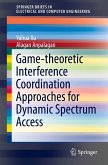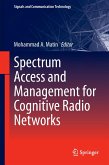This book is targeting at audience who has basic
wireless communication background and would like to
learn more about spectrum coordination problems in
cognitive radio networks. This book focuses on theproblem of efficiently sharing spectrum resources in
wireless networks through the use of appropriate
spectrum etiquette protocols and related coordination
algorithms. The performance of the proposed class of
spectrum etiquette protocols is evaluated in various
wireless network scenarios and compared with simpler
reactive interference avoidance schemes. After
validating its utility for coordination between
existing wireless standards (such as IEEE
802.11/WiFi, Bluetooth, and 802.16/WiMax), the
spectrum etiquette protocol is extended to serve as
the foundation for a more complete adaptive wireless
network where radio nodes may cooperate by forming or
joining autonomous ad hoc clusters with multi-hop
routing. A cognitive radio protocol stack is proposed
for this scenario. Validation results using a
combination of ns-2 simulations and experiments on
the 20x20 ORBIT radio grid testbed are presented in
this book.
wireless communication background and would like to
learn more about spectrum coordination problems in
cognitive radio networks. This book focuses on theproblem of efficiently sharing spectrum resources in
wireless networks through the use of appropriate
spectrum etiquette protocols and related coordination
algorithms. The performance of the proposed class of
spectrum etiquette protocols is evaluated in various
wireless network scenarios and compared with simpler
reactive interference avoidance schemes. After
validating its utility for coordination between
existing wireless standards (such as IEEE
802.11/WiFi, Bluetooth, and 802.16/WiMax), the
spectrum etiquette protocol is extended to serve as
the foundation for a more complete adaptive wireless
network where radio nodes may cooperate by forming or
joining autonomous ad hoc clusters with multi-hop
routing. A cognitive radio protocol stack is proposed
for this scenario. Validation results using a
combination of ns-2 simulations and experiments on
the 20x20 ORBIT radio grid testbed are presented in
this book.







